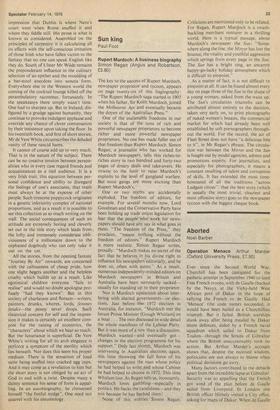Sun king
Paul Foot Rupert Murdoch: A business biography Simon Regan (Angus and Robertson, £3.80) The key to the success of Rupert Murdoch, newspaper proprietor and tycoon, appears on page twenty-six of this hagiography: "The Rupert Murdoch saga started in 1903 when his father, Sir Keith Murdoch, joined the Melbourne Age and eventually became the doyen of the Australian Press."
One of the inalienable freedoms in our society is that of the sons of rich and powerful newspaper proprietors to become richer and more powerful newspaper proprietors. No one has made fuller use of that freedom than Rupert Murdoch. Simon Regan, a journalist who has worked for Murdoch newspapers, tells this riches-toriches story in two hundred and forty-two pages of dreary deals and take-overs. He strains to the limit to raise Murdoch's exploits to the level of gangland warfare. But most gangs are more exciting than Rupert Murdoch's.
One or two myths are accidentally exploded. The freedom of editors, for example. For several months now, Lord Goodman and the Conservative Party have been holding up trade union legislation for fear that the people who work for newspapers should have any say in what goes in them. "The freedom of the Press," they proclaim, "means nothing without the freedom of editors." Rupert Murdoch is more realistic.. Simon Regan writes, proudly: "Murdoch makes no secret of the fact that he believes in his divine right to influence his newspapers editorially, and he does so, often with gusto." As a result, numerous independently-minded editors on Murdoch newspapers in Britain and Australia have been summarily sacked— usually for standing up to their proprietor.
Nor is Murdoch squeamish about interfering with elected governments—or elections. Just before the 1972 election in Australia, for instance, "Murdoch met the future Prime Minister [Gough Whitlam] on a boat ... The two discussed in wide detail the whole manifesto of the Labour Party. But it was more of a row than a discussion. Murdoch wanted—and eventually got— changes in the election programme for his support." Only last month, Murdoch was intervening in Australian elections again, this -time throwing the full force of his newspapers against the man whose policy he had helped to write and whose Cabinet he had helped to choose in 1972. This time Whitlam lost. As Regan tells us, incessantly, Murdoch loves gambling—especially in politics. He backs the candidates—and they win because he has backed them!
None of this worries Simon Regan.
Criticisms are mentioned only to be refuted. For Regan, Rupert Murdoch is a swashbuckling merchant venturer in a thrilling world. Here is a typical passage, about Murdoch's newspaper the Sun: "Somewhere along the line, the Mirror has lost the bounce, the vitality and youthful aggression which springs from every page in the Sun. The Sun has a bright zing, an uncanny happy-go-lucky holiday atmosphere which is difficult to pinpoint."
As a matter of fact, it is not difficult to pinpoint at all. It can be found almost every day on page three of the Sun in the shape of a young woman, naked from the waist up. The Sun's circulation triumphs can be attributed almost entirely to the decision, taken very early on, to print photographs of naked women's breasts, the commercial market for which had already been well established by soft pornographers throughout the world. For the record, the air of Fleet Street does not have "a delicious bite to it", in Mr Regan's p'hrase. The circulation war between the Mirror and the Sun is fought out by model agencies, admen and promotions experts. For journalists, and especially for photographers, it means a constant insulting of talent and corruption of skills. It has extended the most timehonoured of all the traditions "across Ludgate circus": that the best story (which is usually the most trivial, sleaziest and most offensive story) goes to the newspaper tycoon with the biggest cheque book.


































 Previous page
Previous page